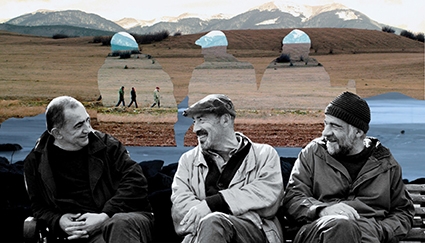Parade: a Georgian Film in the Truest Sense
Review
It is raining outside as a man dances in firelight with a prostitute. It’s getting cold. He tells her she’s beautiful and pulls her close, saying he hasn’t danced since his teenage son was born. He swoons. His friends will make fun of him in the morning.
This is a scene from Nino Zhvania’s 2018 film ‘Parade,’ which opened Tbilisi’s 19th Film Festival opened Monday evening at Amirani Cinema, featuring the special appearance of the Italian Ambassador, and the entire cast taking to the stage before its screening to a packed auditorium.
If I was to tell you ‘Parade’ portrays the longing of the human spirit via a trio of upper-middle aged, foul-mouthed Georgian men in the company of prostitutes around a fire, the only phrase that will come to mind is “oh brother.” So instead, I will only say this is a film you must see. It is one that will confound every Georgian stereotype you harbor.
The film opens with Tazo, a frustrated painter, on at Tbilisi’s Dry Bridge flea market, angry with shame when his son shows up, sent by his mother and asking for money for a class excursion. Along with the kitchy paintings he has grown to despise, Tazo hawks a tray of kantsi, the traditional goat horn drinking vessel for wine, a must-get for any souvenir-savvy visitor. We cringe as he knocks down his prices in 5 Lari chunks for unimpressed European tourists who mutter and soon shake their head and shuffle on.
Yet any viewer hoping for a segue into the ills of globalization or the assault on cultural heritage will be disappointed with ‘Parade.’ This is a film that avoids moralizing and navigates around the easy reservoirs of sentiment and nationalism. We watch, full of conflict ourselves, as a man reluctantly experiences the first stirrings of intimacy in a decade as he slowly dances with an incidental woman. He describes it as his swan song the next day. Melodrama deconstructs itself.
This is the story of three childhood friends, long-separated, who grew up in a world that failed around them. Their lives emerge for us in both subtle and startling glimpses: prison-hardened Tazo takes a beating for the swindling Trulaila. Filthy stories are forthcoming, ending with maxims such as, “grandmothers are off-limits.” Our heroes are unable to remember what their grandfathers would yell, as they drive stubborn sheep from an abandoned building where they’ve taken shelter from the rain.
These are Georgian men who have grown up in Georgia but are no longer sure they know what that means. One a former prisoner, one a failing actor, and one sells bric-a-brac to Europeans. In a scene utterly stereotypical yet magnificently original, the trio ends up in a restaurant drinking heavily and eating Khinkali and discover in each other what they had not even realized they had lost so long ago. Sounds saccharine? If you think so, it is only because you haven’t yet seen ‘Parade.’
In the quixotic character Trulaila, we sense these friends are the only people he has never cheated. In Guram, we see the storm of frustration under the cool and proud exterior of an ex-convict. And if the adaptation of aging Georgian men to art house should raise any misgivings, Tezo himself beats us all to them: “such films are dickheads walking back and forth on a railroad track,” he says, a line at which point the entire audience at the cinema erupted in applause.
Hemingway simply wrote about a big fish. "There isn't any symbolism. The sea is the sea. The old man is the old man,” he said. “The boy is a boy and the fish is a fish.” We should also hesitate before seeing symbolism in ‘Parade.’ We watch the three flee a restaurant and take refuge in an obscene parade passing. With a fit of coughing, one staggers into a stable and collapses, just as a beautiful horse is lead out. “It’s getting cold,” Tezo remarks. I’ll let you, dear reader, see what you will.
‘Parade’ is a Georgian film in the truest sense. Far from catering to European film critics and festival audiences, one is captivated by a dawning awareness that only Georgians will fully grasp its pathos and conflicts. Non-Georgians will understand Georgia better while perceiving how much they don't know. Expats will be left grappling with questions like, “Who the hell are we to think we know so much about Georgia?”
By Ryan Sherman
Image source: tiff.net











